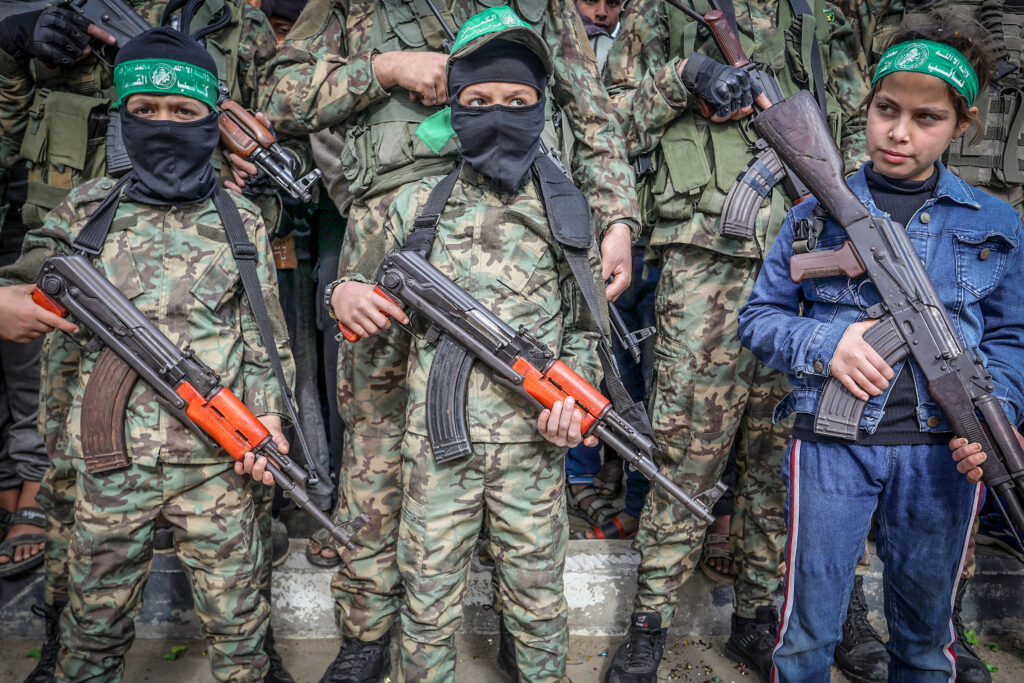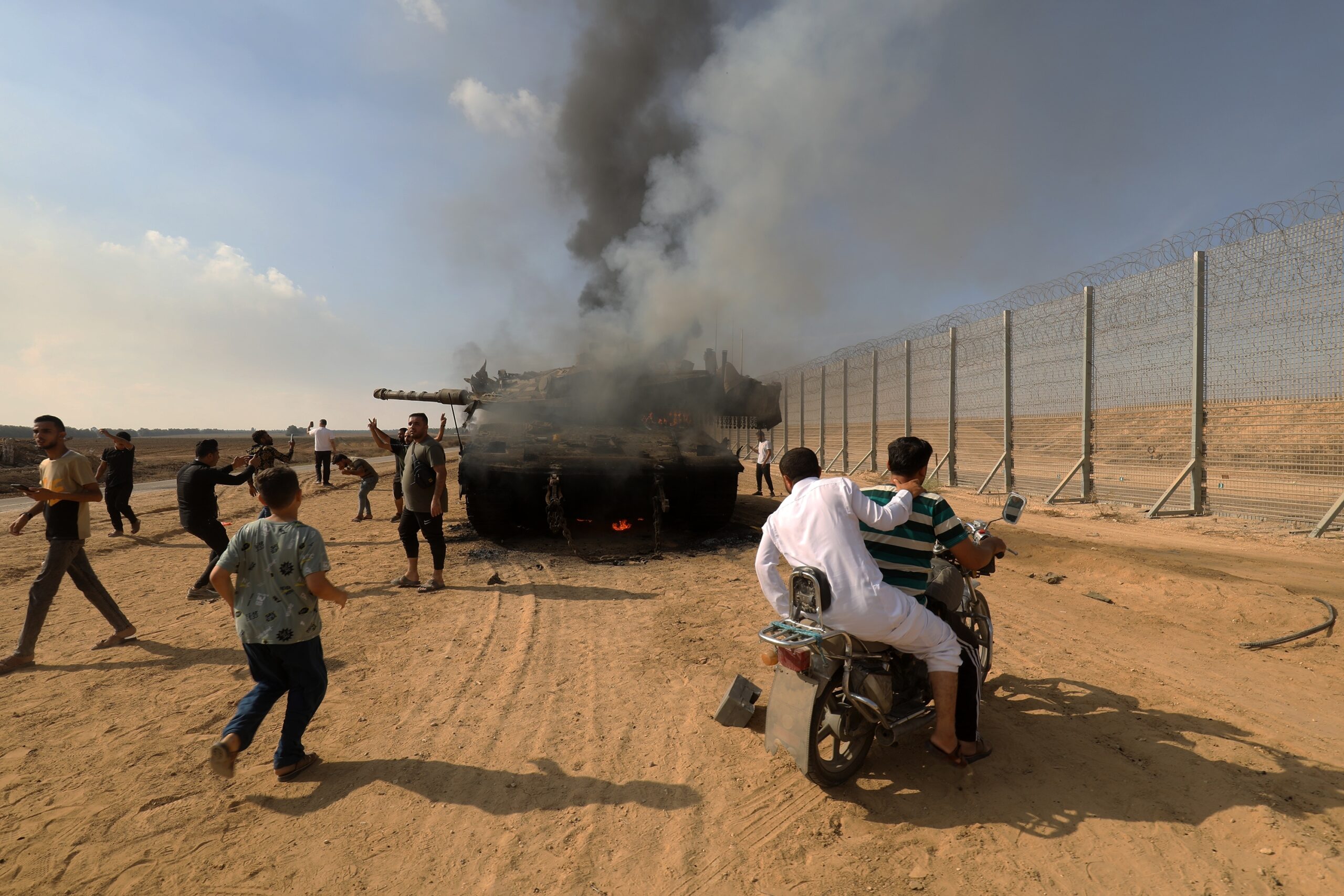In a revealing interview on Al-Jazeera on August 2, 2025, Hamas political bureau member Ghazi Hamad openly acknowledged what many pro-Israel observers have long suspected: the October 7 massacre was not merely an act of terror, but a calculated strategic operation designed to delegitimize Israel internationally and advance Palestinian statehood recognition through violence.
Hamad’s comments exemplify the broader Palestinian narrative that seeks to justify the October 7 atrocities by placing them within what he calls their proper historical “context.” Like many pro-Palestinian voices who defended the massacre in its immediate aftermath, Hamad argued that the world’s focus on October 7 misses the larger picture.
“The Palestinians are not doing anything illegal. We are fighting for our freedom. We are not terrorists and we are not using any terrorist methods. We have a right to fight. Even October 7… The world thinks that history has stopped on October 7. No! History started in 1948,” Hamad declared, employing the familiar refrain that violence against Israeli civilians should be understood as legitimate resistance within the broader conflict’s timeline.
This represents the same moral framework used by October 7 apologists worldwide – that the deliberate targeting of civilians, including children, elderly, and others at a music festival, should be viewed not as terrorism but as justified military action when placed in “proper context.”
Senior Hams official Ghazi Hamad to Al Jazeera: "The initiative by several countries to recognize a Palestinian state is one of the fruits of 10/7."
— Raylan Givens (@JewishWarrior13) August 3, 2025
"We adhere to the weapon of resistance. We will not hand over even a single bullet." pic.twitter.com/nBfZdKPajg
Perhaps most significantly for Israeli security concerns, Hamad explicitly described the conflict as involving all Palestinians, not just those in Gaza. His comments reveal Hamas’s view of Palestinians throughout Judea and Samaria as active participants in an ongoing war against Israel.
“I’m not talking just about [Hamas], but about all Palestinians, and all members of the Palestinian factions, who bore arms, fought, waged Jihad, were martyred, and irrigated the soil with their blood,” Hamad stated, making clear that Hamas sees the conflict as a comprehensive effort involving Palestinians across all territories.
He emphasized that weapons remain central to the Palestinian cause: “The weapons constitute the Palestinian cause. Our weapons equal our cause. We have been raised since childhood… The [weapons] have always been our main force in confronting the occupation.” This weaponization mindset, according to Hamad, extends beyond Gaza to encompass all Palestinian communities.
The Hamas official was explicit about their refusal to disarm: “We, as Palestinians, will not surrender our weapons. They need to understand this. Not even a blank round… Israel can only dream that we will ever surrender our weapons to it.”
Hamad proudly outlined what he considers the three major “achievements” of October 7, revealing how Hamas views international anti-Israel sentiment and rising antisemitism as strategic victories.
The first achievement, according to Hamad, was forcing international recognition of Palestinian statehood: “Why are all these countries recognizing Palestine now? Had any country dared to recognize the state of Palestine, prior to October 7? The overall outcome of October 7 forced the world to open its eyes to the Palestinian cause.”

This acknowledgment comes as several European nations, including France and the United Kingdom, are indeed preparing to recognize Palestinian statehood. Recent reports from Axios have also revealed that House Democrats had petitioned the Biden administration to pursue similar recognition, lending credence to Hamad’s assessment of October 7’s diplomatic impact.
The second achievement Hamad celebrated was the global delegitimization of Israel: “The whole world believed that the occupation state is a beautiful democratic country… Today, I believe that the whole world has become convinced [otherwise], and that the mask has fallen from Israel’s face.”
He specifically highlighted anti-Israel demonstrations worldwide as evidence of this success: “The whole world is acting against Israel. The rallies and festivals in America, Britain, France, and Germany talk about the genocide.” Hamad also noted with satisfaction that “the PM of the occupation state would become wanted by the ICC, and so would the [IDF] Chief of Staff.”
Perhaps most ominously, Hamad’s third proclaimed achievement was demonstrating Israel’s perceived vulnerability: “People who thought that defeating Israel is difficult [realized] today that it is very easy. Today, through October 7, we proved that defeating Israel is not as difficult as people had thought.”
This statement reveals how Hamas views October 7 not as an isolated incident but as proof of concept for future attacks and a recruitment tool for inspiring additional violence against Israel.
Hamad’s candid assessment confirms what many Israel supporters have argued since October 7 that the massacre succeeded in its broader strategic objectives despite Israel’s military response in Gaza. The international community’s rush to recognize Palestinian statehood, the global surge in anti-Israel sentiment, and the increasing isolation of Israel in international forums all represent, from Hamas’s perspective, validation of their terrorist strategy.
For pro-Israel audiences, Hamad’s comments serve as a stark reminder that October 7 was not merely a spontaneous outbreak of violence, but a calculated act designed to achieve specific political and diplomatic goals – goals that, by Hamas’s own admission, have largely been realized through the international community’s response.
The interview demonstrates that Hamas views the global reaction to October 7 – from European statehood recognition to campus protests to ICC proceedings – as proof that terrorism works as a diplomatic strategy. This reality underscores the urgent need for Israel’s allies to recognize how their responses to October 7 may inadvertently reward and encourage future acts of terror against Israeli civilians.




